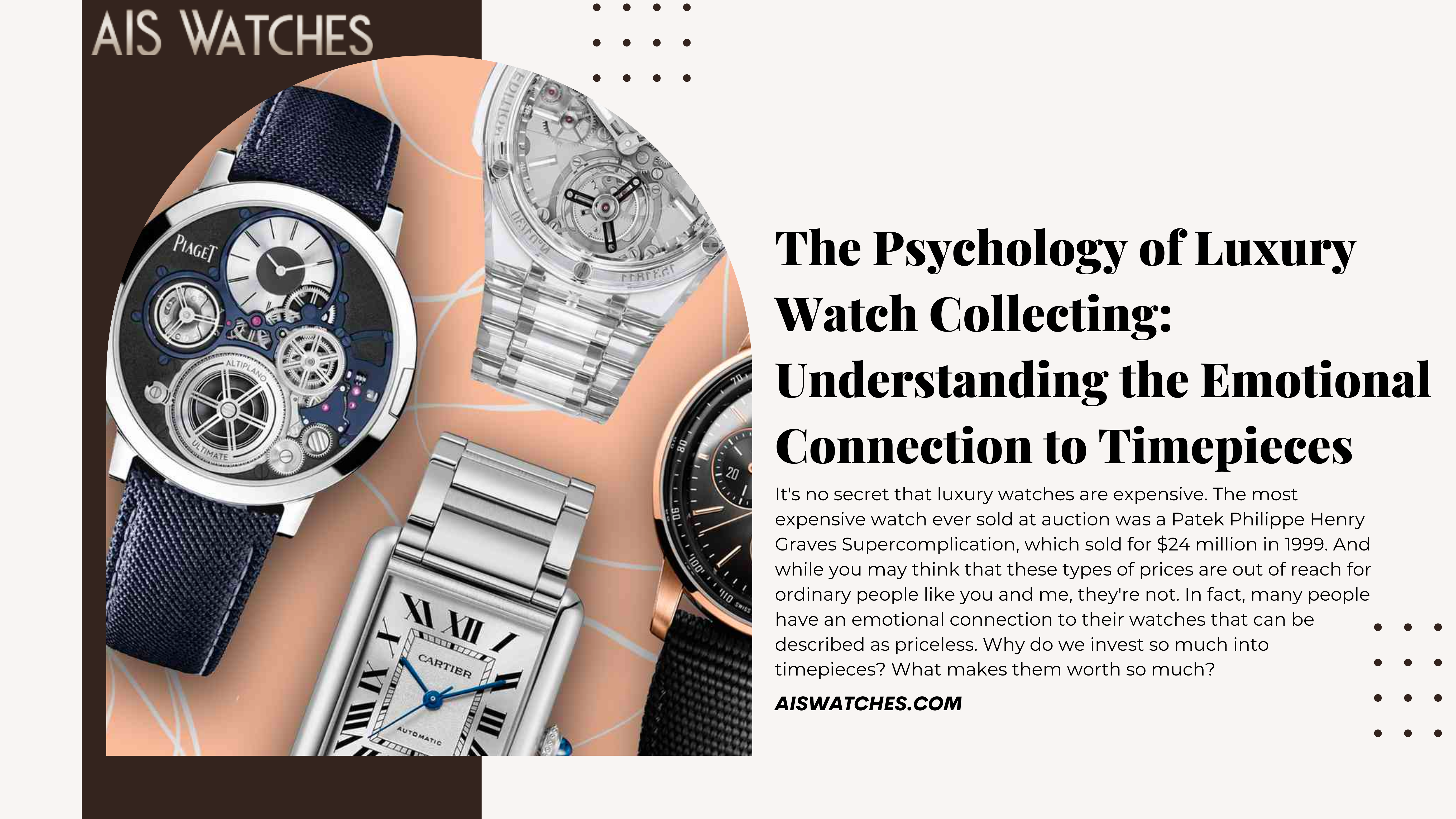The Psychology of Luxury Watch Collecting: Understanding the Emotional Connection to Timepieces
Posted by AIS Watches on Apr 4th 2023
It's no secret that luxury watches are expensive. The most expensive watch ever sold at auction was a Patek Philippe Henry Graves Supercomplication, which sold for $24 million in 1999. And while you may think that these types of prices are out of reach for ordinary people like you and me, they're not. In fact, many people have an emotional connection to their watches that can be described as priceless. Why do we invest so much into timepieces? What makes them worth so much?

High-end watches make you feel good
There are many reasons why people buy luxury watches. Some want to show off their status, others want to make an investment and some just want a piece of art on their wrist that can be admired by all. Whatever your reason may be, there's no denying the fact that owning a high-end timepiece makes you feel good about yourself.
The psychology behind this phenomenon is quite simple: when you wear something beautiful and expensive, people will notice it--and they'll assume that because you chose to buy that particular item (as opposed to something less expensive), then it must mean something about who you are as a person. In other words: people will judge how successful or powerful they think you are based on what kind of watch is strapped onto your wrist!
Luxury watches are status symbols
The most obvious reason to buy a luxury watch is because it's a status symbol. Watches are worn by people who have achieved success and financial stability, which in turn means that they can afford expensive things like watches.
Watches are also symbols of wealth and success in less obvious ways. If you're wearing an expensive timepiece, other people will assume that you have money--even if they have no idea how much it actually costs! They'll be impressed by your ability to afford such an extravagant item (and may even think less of themselves for not being able to do the same). This gives watches an air of exclusivity: only those with enough income can wear them without feeling out of place or self-conscious about their appearance.
Watching time is also about seeing yourself through time
When you look at your watch, you're looking at the past and future in one glance. It's not just about knowing how much time has passed, but being able to see it as well.
That's why some people collect watches: they want to create a sort of personal timeline with their collection--a visual representation of where they have been and where they are going.
Hoarders and collectors share a psychology with luxury watch collectors
When you think of hoarders, what comes to mind? A person who has a house filled with junk, who can't throw anything away and doesn't have any friends because they're too busy collecting stuff? Or perhaps you picture someone who collects things like stamps or coins, amassing collections worth thousands or even millions of dollars.
What do all these different types of collectors have in common? They share a psychology with luxury watch collectors--a love for collecting items that are perceived as valuable by others. But there's an important difference between them: While some collectors keep their prized possessions forever, others seek to sell them as soon as possible so they can buy something else!
The psychology of collecting is not often discussed in the context of high-end wrist watches, but it makes logical sense for people to have this type of relationship with the objects they purchase and display around them.
Collecting is a way of expressing identity and status, as well as belonging to a group. Collectors may be motivated by one or more of these factors; however, each collector will have their own unique set of motivations based on their personal experiences and values system.
Luxury watches are an investment, an aesthetic object and an expression of personal identity; all while being an accessory that tells others who we are and what we value.
They're also a status symbol: the fact that you have one says something about your position in society.
Watches tell others who we are and what we value because they mark our membership in particular social groups, such as high-powered executives or sports enthusiasts. While some people may look down on those who wear luxury watches as vain materialists with shallow values, this isn't necessarily true; owning a luxury watch can indicate that its owner has worked hard enough to earn it (or inherited it from someone else).
Luxury watches are an investment, an aesthetic object and an expression of personal identity; all while being an accessory that tells others who we are and what we value. The psychology behind luxury watch collecting is complex but fascinating. It goes beyond simply spending money on a nice piece of jewelry; it involves deep emotional connections between the owner and their possessions. Understanding this connection can help us understand why people choose to spend so much money on these timepieces in the first place!
 Menu
Menu




